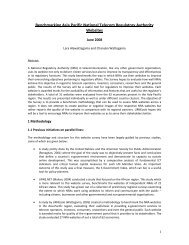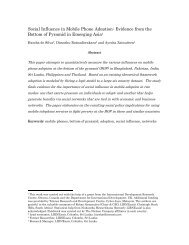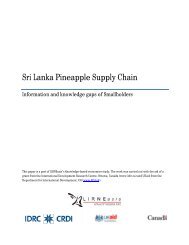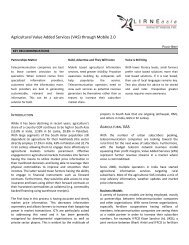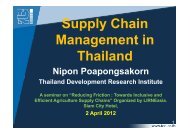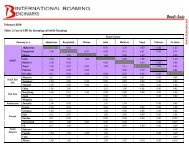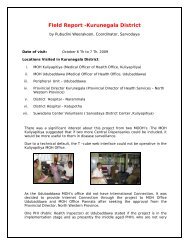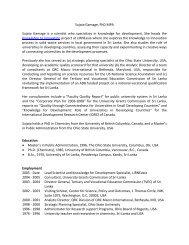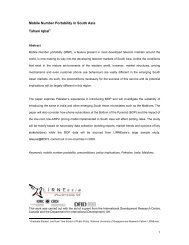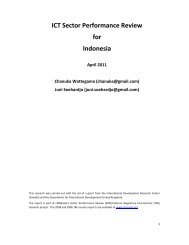Teleuse@BOP3: A Qualitative Study - LIRNEasia
Teleuse@BOP3: A Qualitative Study - LIRNEasia
Teleuse@BOP3: A Qualitative Study - LIRNEasia
Create successful ePaper yourself
Turn your PDF publications into a flip-book with our unique Google optimized e-Paper software.
male initiators, however, purchase the SIMs taking money from the user who needs the SIM. In Pakistan, Abed<br />
Ansar’s 3 sons in Jatoi, practically modulate his entire phone use. His eldest son sent him his own second handset<br />
with a Telenor SIM since that is what he primarily uses. The two younger sons have subsequently got his assent to<br />
purchase two additional SIMs of Mobilink Jazz and Ufone, indicating that their elder brother also use these SIMs at<br />
different points of the day. Both these sons now also use these two additional SIMs for communicating with their own<br />
friends and often keep them on themselves than with their father. The father does not particularly mind this since he<br />
believes that the sons understand such things better than him.<br />
Managing contacts of parents is a fundamental way in which youngsters in all these countries are assisting their<br />
parents. About 80% of the parent groups in our entire sample are non-English literate while the remaining 20% can<br />
manage with difficulty. Very few, mostly in Philippines and some in Sri Lanka, managed to understand and<br />
communicate in English with adequate ease. This is substantially because all the countries except Philippines use<br />
non Roman scripts. As a result, parents are inevitably turning to their children, for both linguistic and technology<br />
assistance.<br />
The assistance with managing contacts comes most often in the form of inserting new contacts. In recurrent<br />
incidents, we saw the contact’s name being written as ‘Uncle / Aunt (in national language) XYZ.’ On being probed,<br />
the main respondents clarified that these are not their uncles and aunts but rather their brothers and sisters. The<br />
younger children insert these names in English but they do so often with several errors in spellings. The numbers,<br />
however, are correct. The older respondents indicate that this is a useful practice since they can monitor the number<br />
insertion in the phone and their children also get better in using the device, which they can then teach them as well.<br />
The youth as well as the children are also instrumental in reloading. This is specifically visible in Pakistan and<br />
Bangladesh with female respondents. The younger women in Pakistan rely on their elder brothers and younger<br />
siblings to whom they give the amount of their reload and their numbers written on papers at times. Housewives also<br />
do the same. In Bangladesh, the same, however, is done primarily by housewives. As indicated above, the cause for<br />
this is to avoid negative commentary on their excess phone use. The majority of the women found this process<br />
reliable and only one woman expressed any concern over her child losing the money on the way. On an average,<br />
children around 8 years and above are the ones who are being given such responsibilities.<br />
Children from the age of 8 to those in their youth are all seen to be using their parents’ phones for the purposes of<br />
sending SMS forwards, typed text messages as well as for downloading ring tones. This is widely visible in Pakistan,<br />
India and Bangladesh. While younger children send sms forwards for their parents on special occasions like Eid,<br />
Ganesh Chaturathi and New Year in India, Pakistan and Bangladesh, they also often send blank (empty) messages<br />
to their friends both as a joke and sometimes by mistake to people on their parents’ contact list. Such incidents result<br />
in concerned calls from the other party but are not considered to be a nuisance by the parents. The younger children<br />
use the radio feature frequently as seen in the households of Vaishali in Mumbai, the Afeez in Bangladesh and<br />
43




